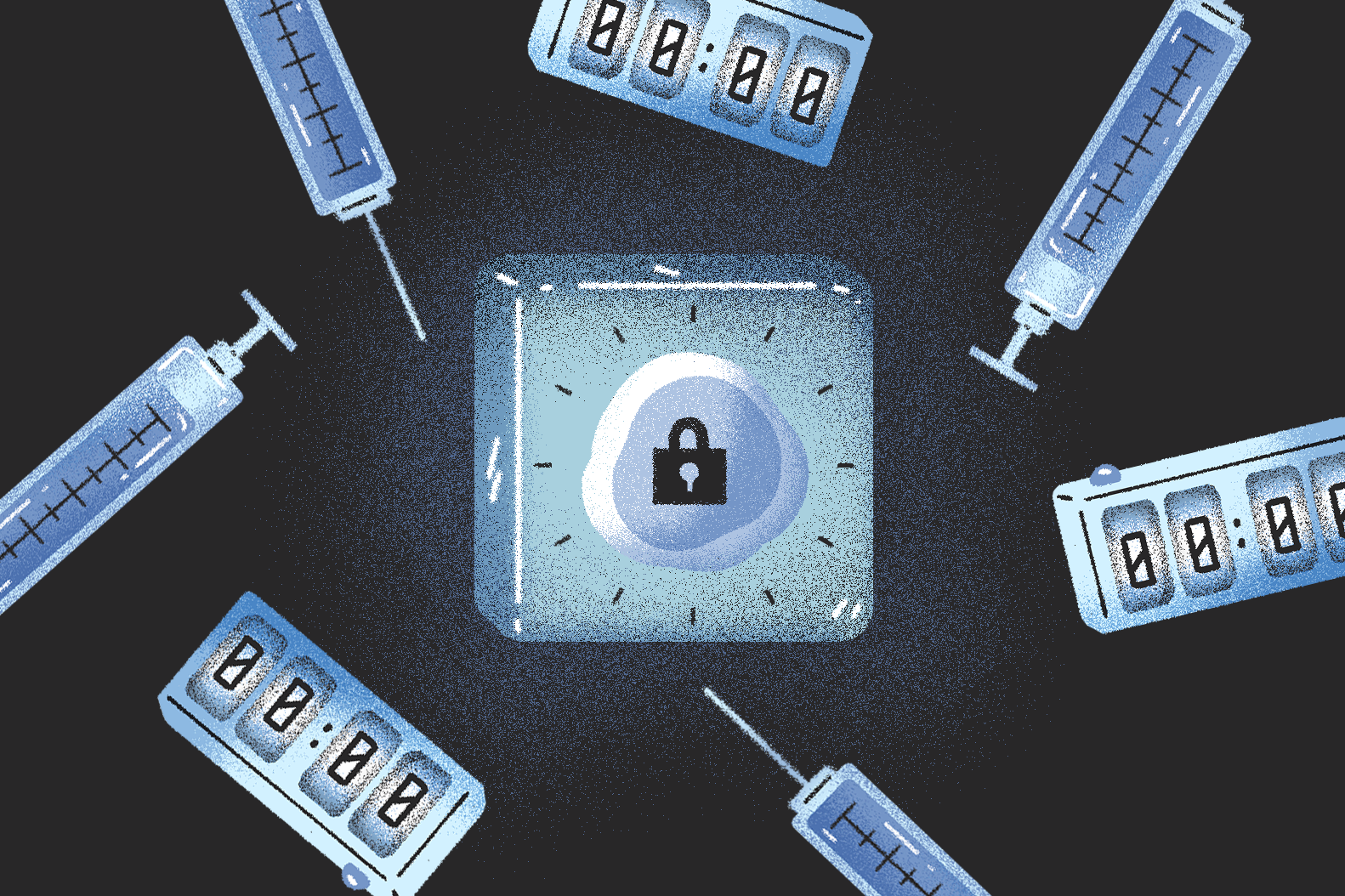In a landmark decision that will impact women in Singapore aged 21 to 35 years old, the Government has put forward a recommendation to give them the choice to freeze their eggs for non-medical reasons.
This is one of the 25 action plans under the new White Paper on Singapore Women’s Development that was submitted to Parliament last Monday (March 28) and will be debated by the House this week.
In effect, this would allow women in that age range, regardless of marital status, to opt for elective egg freezing from as early as 2023.
Currently, this procedure is only legal for women who have medical issues that may affect their fertility, e.g. patients undergoing chemotherapy.
Explaining the policy shift, the White Paper recognised that “some women desire to preserve fertility because of their personal circumstances”.
Reacting to the news, several women interviewed by local media applauded the proposal, which would benefit not just singles who are thinking of travelling overseas for such a procedure, but also newly married couples who don’t want children yet.
Wanting to hear more views on this significant move, Thir.st reached out to Christian women representing different age groups and marital statuses to hear what they had to say.
- Wong Siqi, 28, video producer (SQ)
- Amanda Chong, 32, lawyer, poet and co-founder of ReadAble (AC)
- Benita Lim, 34, PhD student in theology and culture (BL)
- Tam Wai Jia, 35, doctor and founder of Kitesong (WJ)
- Carol Loi, 50, digital literacy educator and family coach (CL)
- Kwa Kiem Kiok, 58, lecturer (KK)
Here are the key points they raised.
1. Do we understand how the issue of fertility affects women?
AC: I have friends who have frozen their eggs because they aren’t sure whether there is a partner on the horizon.
A woman’s biological clock can induce real anxiety, unlike our male counterparts who don’t have monthly reminders of a looming reproductive expiration date.
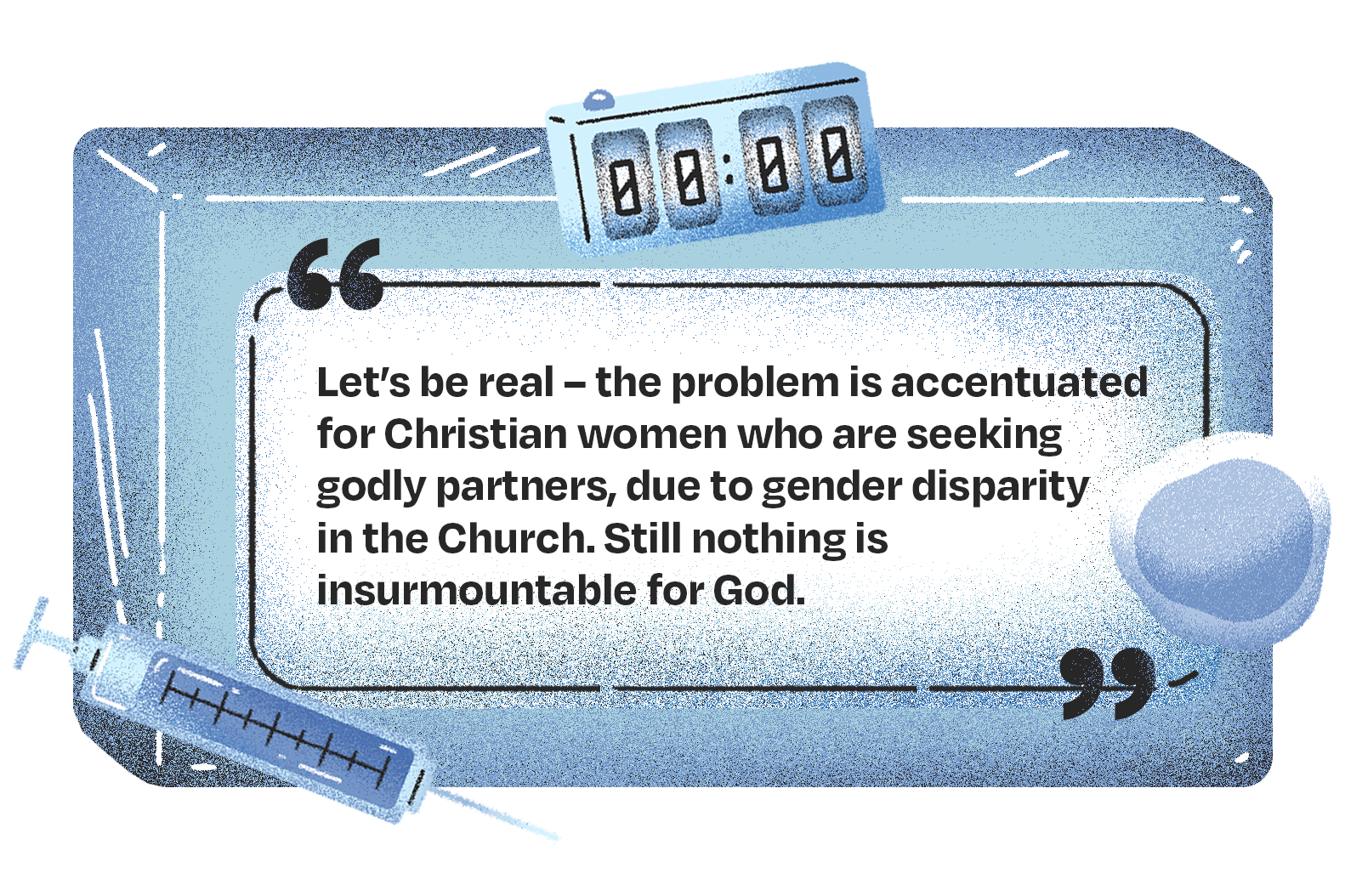
BL: There are many reasons not within our control as to why we are getting married or giving birth later. The struggle, loneliness and pressure are very real. Remaining single is a reality that many of us have to face.
We can cling to God but we are humans who also need community, and many have innate desires to be mothers since we were after all created to “be fruitful and multiply” (Genesis 1:28), among other purposes.
CL: Having battled infertility in my 20s, I can understand the intense desire for a biological child, the cycles of hope, and the many moments of intense frustration, anxiety and deep sadness.
2. What does our view on social egg freezing say about our belief in the sovereignty of God?
AC: If I am meant to have a child, I trust I will marry at a time when I have viable eggs.
His wisdom is higher than mine, and I have confidence that God will not withhold any good thing from me (Psalm 84:11).
Let’s be real – the problem is accentuated for Christian women who are seeking godly partners, due to gender disparity in the Church. Still nothing is insurmountable for God.
Instead of living in scarcity and striving, I would like to live in abundance and gratitude for the very present joys I have before me.
I ask God to give me this quiet trust every day, to water the deepest parts of my soul so that I may know in Him I lack nothing (Psalm 23:1).
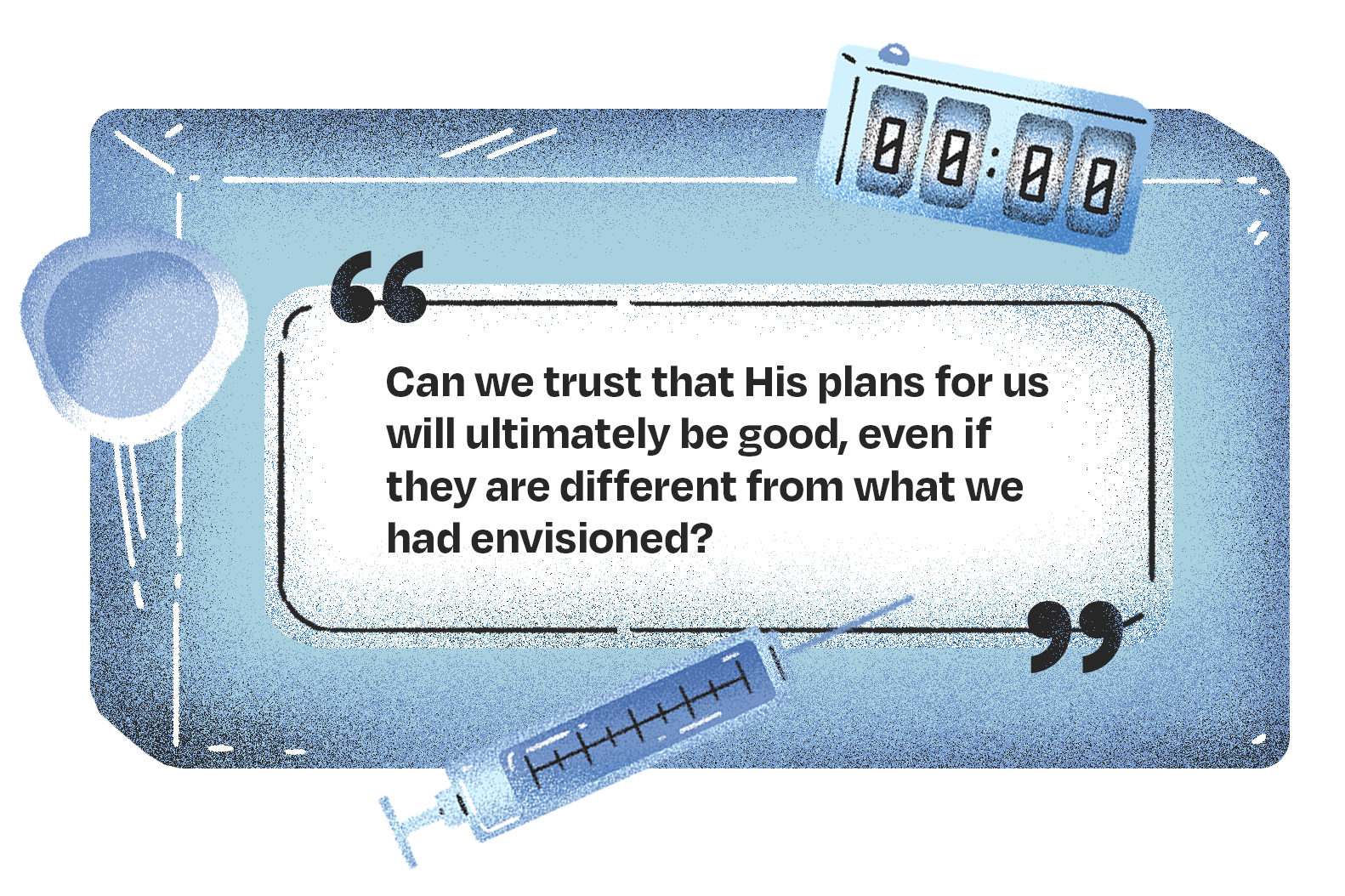
WJ: When I decided to marry my cancer-surviving, post-liver-transplant husband, Cliff, it was at a time where he was diagnosed with his first liver complication.
Besides the possibility of losing him, I was faced with another question: “If he survives and you marry him, what if you cannot have children due to side effects of his long-term medications?”
It was then I felt God challenge me: “Will you centre your life around the possibility of having children or Me?”
As we step into His invitation to lead a life of faith, wholly submitted to His will, can we trust that His plans for us will ultimately be good, even if they are different from what we had envisioned?
SQ: While I haven’t found a biblical principle that directly supports social egg freezing, I also haven’t found a compelling reason to say that it is unbiblical.
Some have said it’s an issue of trusting in God versus playing God. But egg freezing doesn’t guarantee that the embryo will successfully attach itself to the womb lining.
It doesn’t ensure that there won’t be miscarriages. It doesn’t guarantee a healthy newborn. There are many factors that are outside of one’s control.
CL: Have we considered God’s design for marriage, sex and family?
I believe marriage is a “one flesh” union (Genesis 2:24), joining both a man and a woman together at every level of their being. When speaking about marriage, Jesus Christ also pointed to this original design (Matthew 19:1-9).
The sexual union between a man and woman produces children to form a family unit. However, social egg freezing removes the need for sex in procreation, which could lead to ripple effects beyond what was originally intended.

In addition, God has designed the bodies of women and men to be different. Unlike men who produce sperm throughout their lives, women are born with all the eggs in their life. Regardless of what we think the equality of women and men should be, this is a biological reality.
Over time, our bodies will also naturally decline in health. As we think about when to have children, we should consider our duty and responsibility towards others whom God has placed in our lives.
Having children earlier in our lives means we will have more energy and time to nurture our children while our parents are younger and healthier.
KK: I suggest that there are grounds for single women who would like to freeze their eggs. Based on her personal autonomy and responsibility, a woman should be able to decide what to do with her own eggs.
A single woman may not have found a suitable life partner when she is biologically at her prime to have children, so preserving her eggs would be a good step, and this could prevent her from getting married just because her biological clock is ticking.
God has given us all the ability to reason, just as he has given us free will as well as responsibility: In all that we do, we have to face the consequences of our decisions and actions (Genesis 1-3).
Freezing eggs is no guarantee that the egg can eventually be fertilised and a healthy child will be born. The woman, and later on her husband, will have to bear this risk and be prepared to accept whatever consequences arise.
3. Are we aware of the impact of social egg freezing on women and children?
BL: I generally am agreeable that this procedure should be used for medical reasons only.
Since there are real risks involved, I am not sure whether I want to go to that length for both myself and the child if I am unable to conceive naturally.
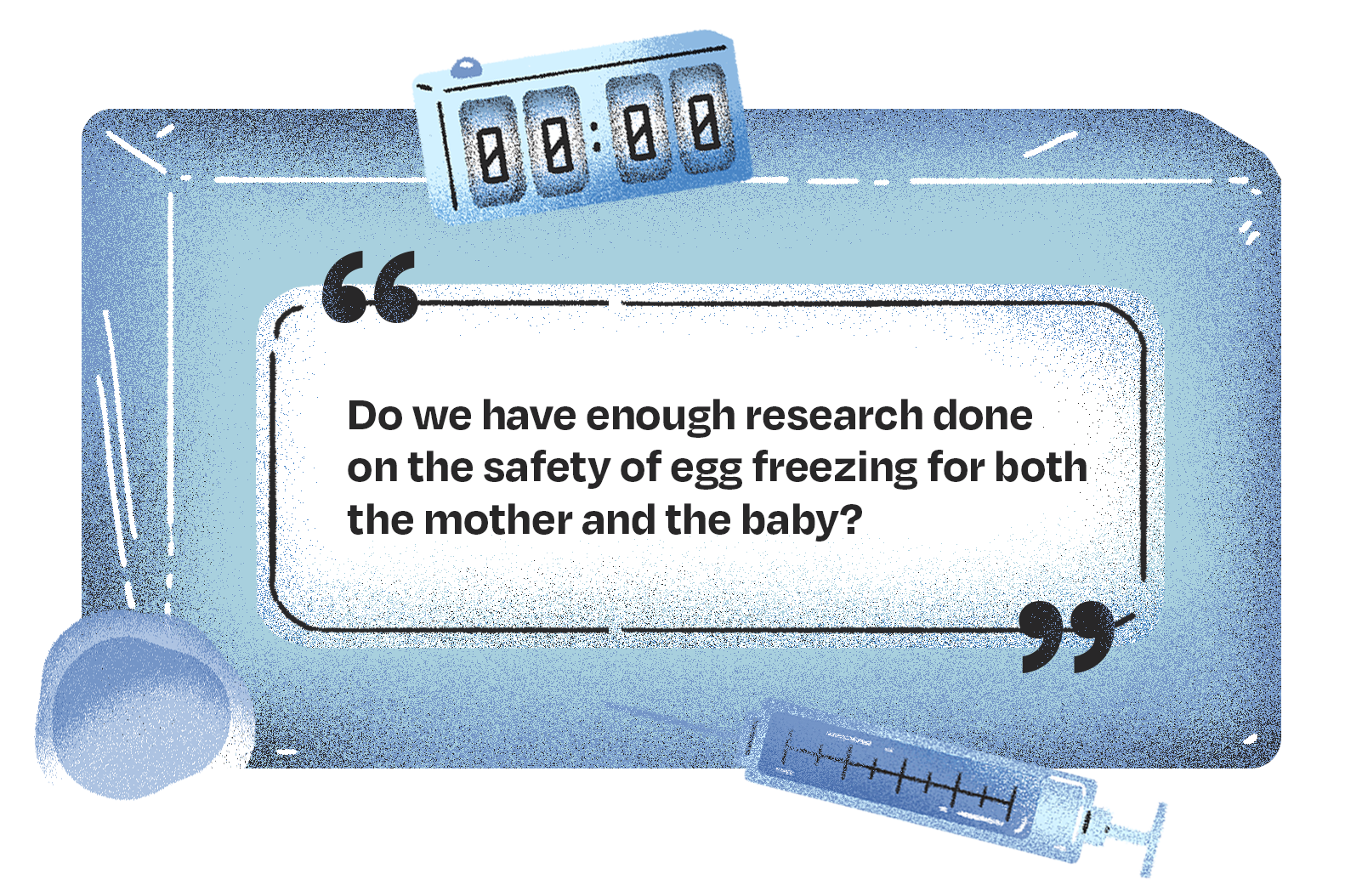
SQ: I do have my reservations on the other aspects of social egg freezing. Do we have enough research done on the safety of egg freezing for both the mother and the baby?
What about the ethical and legal complications surrounding the procedure?
With fertility fraud as one of the consequences of alternative methods for conceiving, do we have adequate measures to protect patients? What if the repercussions are irrevocable?
CL: Social egg freezing puts unnecessary and unfair burden on women. There are huge financial burdens on women; each cycle could cost at least $10,000.
There are also health issues to consider when hormonal injections are used to cause a woman to release more eggs than she normally would in a natural cycle. For instance, ovarian hyperstimulation syndrome is one of the risks.

There are mental health implications too. High stress could be caused by the need for daily injections to manage the hormones for the timely retrieval of eggs.
It is important to note that just because a woman’s eggs are healthy does not necessarily lead to a baby; the quality of a man’s sperm also impacts the couple’s fertility.
In other words, social egg freezing – with all the financial and health implications to a woman – does not guarantee a baby.
4. Will social egg freezing really empower women?
SQ: Social egg freezing only empowers females who can afford it because it’s such an expensive procedure.
What about those who can’t afford such a procedure? Are we truly creating a policy where all women can benefit from?
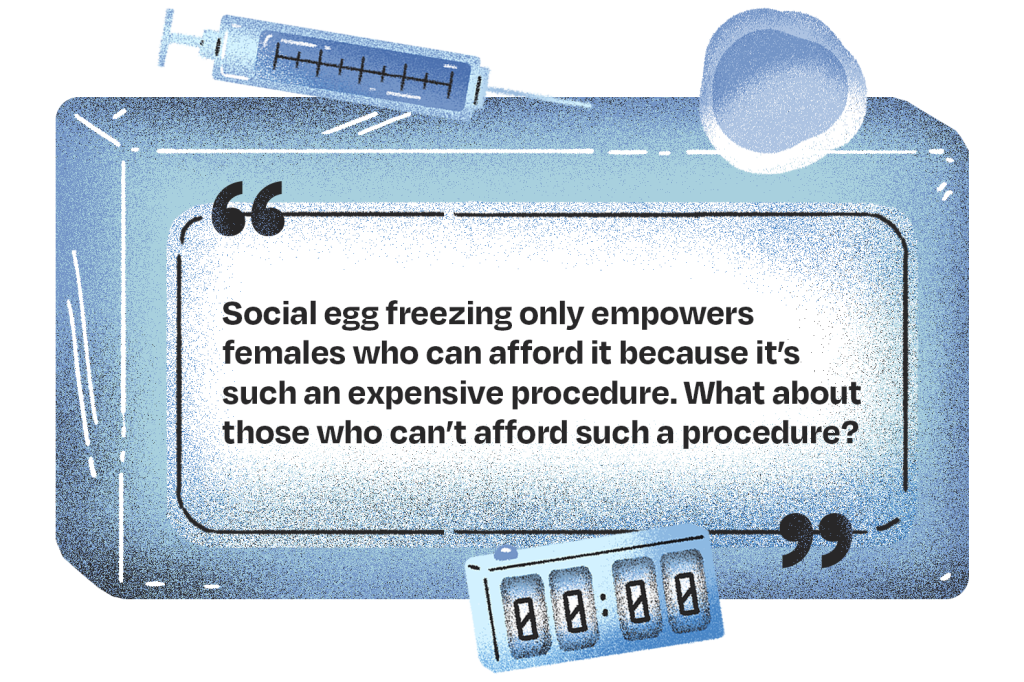
WJ: By extending the timeline for having children, we could also jeopardise the progress hard won in the area of promoting equity for young mothers in the workplace.
I am learning that while the world defines empowerment as giving women power to own more choices, God’s idea of empowerment is endowing us with discernment to make the right choices among those presented to us from the world wisely.
5. Have we considered other implications to social egg freezing?
WJ: Social egg freezing may inadvertently create social inequities.
Advocates suggest setting up a programme to allow younger women to donate a portion of their eggs to those who cannot afford the procedure or to those who are older.
While this appears to promote social equity, this could create more complexities, such as using one’s eggs for income.

Social egg freezing is also a choice made with the possibility of opting for in-vitro fertilisation (IVF) in the future. By doing so, multiple embryos created that may not carry onto pregnancy may be stored, frozen or used in research.
As young women today faced with a bevy of choices about our bodies, we cannot shy away from weighing the implications of our choices.
CL: The issue of egg freezing should be seen in a larger context beyond a woman’s decision of her body, but what else is involved in the process of creating human life.
The development of a human begins with fertilisation. But not every IVF attempt will be successful.
Conceived embryos that are of poor quality may be disposed. Unneeded embryos may also be used for experiments or discarded.
The reliance on such technology for births may also lead to ripple effects and unintended consequences such as issues relating to surrogacy and same-sex parenting. This brings complications to parenthood and children.
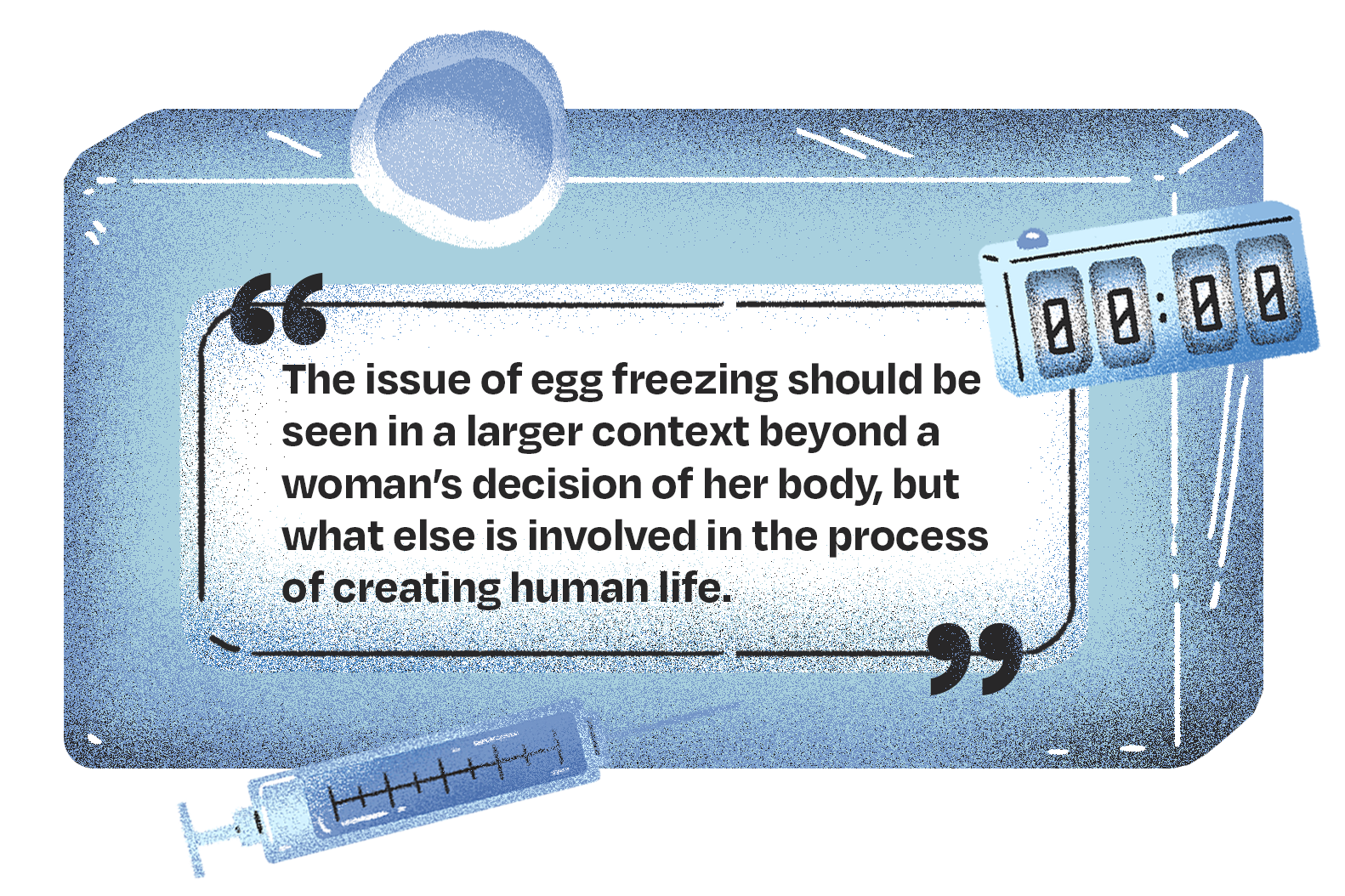
6. Apart from social egg freezing, what other options are there for women wanting to become mothers?
BL: I believe that as a family of God, children need not only their biological families but also spiritual families (Ephesians 2:19–22).
I am also open to adoption, fostering and having god-children. If I cannot have my own children, I can share my love and resources with them.
AC: If I am unable to conceive, I am super open to adoption, which I see as an equally precious way of forming a family. There are so many children in this world waiting to be enfolded in love.
7. How can the Church support women who might be thinking about issues like these?
BL: Christian communities need to be a lot more intentional about the inclusion of singles/childless couples into families. Singles do fall through the cracks in church as normative family units are assumed and celebrated.
When those who get married are spoken of as “settling down” or having found their “other/better half”, or wedding sermons emphasise “a cord of three strands is not easily broken”… you get the picture.
How is the Church as a community supporting singles in their very real desires for intimacy and relationships? What does parenting mean in a world where not everyone will become parents?
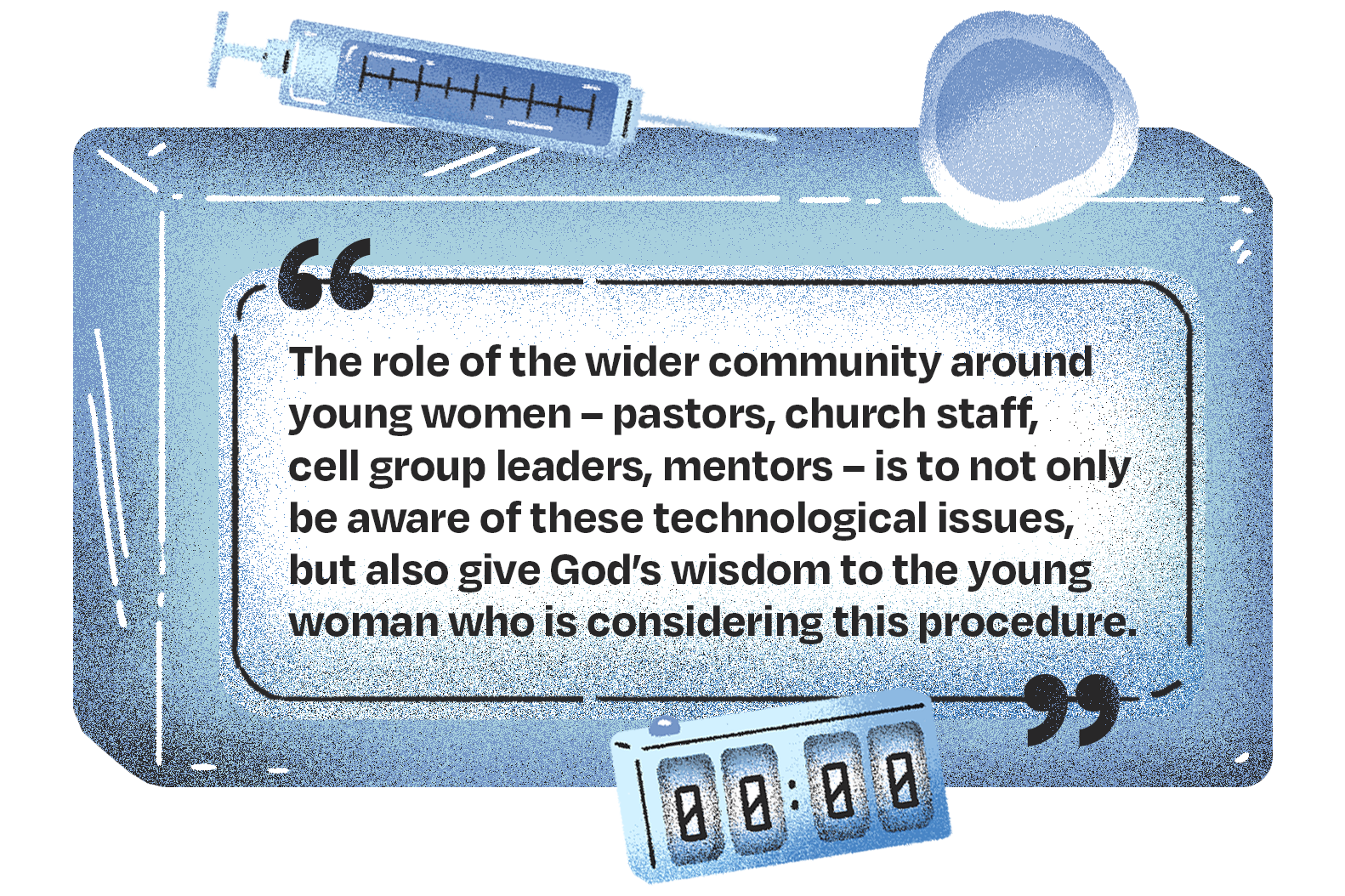
KK: We are all in community (Ephesians 4).
Women must not make these decisions on their own, but should discuss these issues openly and honestly with parents, pastors and trusted others in their community so that together, they can discern what could be the best option.
These questions should be asked: Why does a woman want to freeze her eggs? What are the deep longings in her that lead her to consider taking these steps? How can she find out God’s larger plans for her and how does freezing her eggs fit into these larger plans?
The procedure of extracting eggs is invasive and expensive, and so she should make these decisions knowledgeably, prayerfully and in community.
The role of the wider community around young women – pastors, church staff, cell group leaders, mentors – is to not only be aware of these technological issues, but also give God’s wisdom to the young woman who is considering this procedure.
If you’re a young woman considering this procedure, it will be wise to find out more about the technology and examine the implications.
For now, here are a few things we know.
- Only married couples will be able to use their frozen eggs to try for a baby.
- The Government will implement safeguards including pre-procedure counselling to highlight the invasive nature, limitations (e.g. low success rate of live births), risks of late pregnancy, challenges of aged parenthood and costs involved such as egg storage and insurance.
If you would like to hear more views on this issue, you can also refer to the full statement released by the National Council of Churches in 2019, which highlights some important considerations.
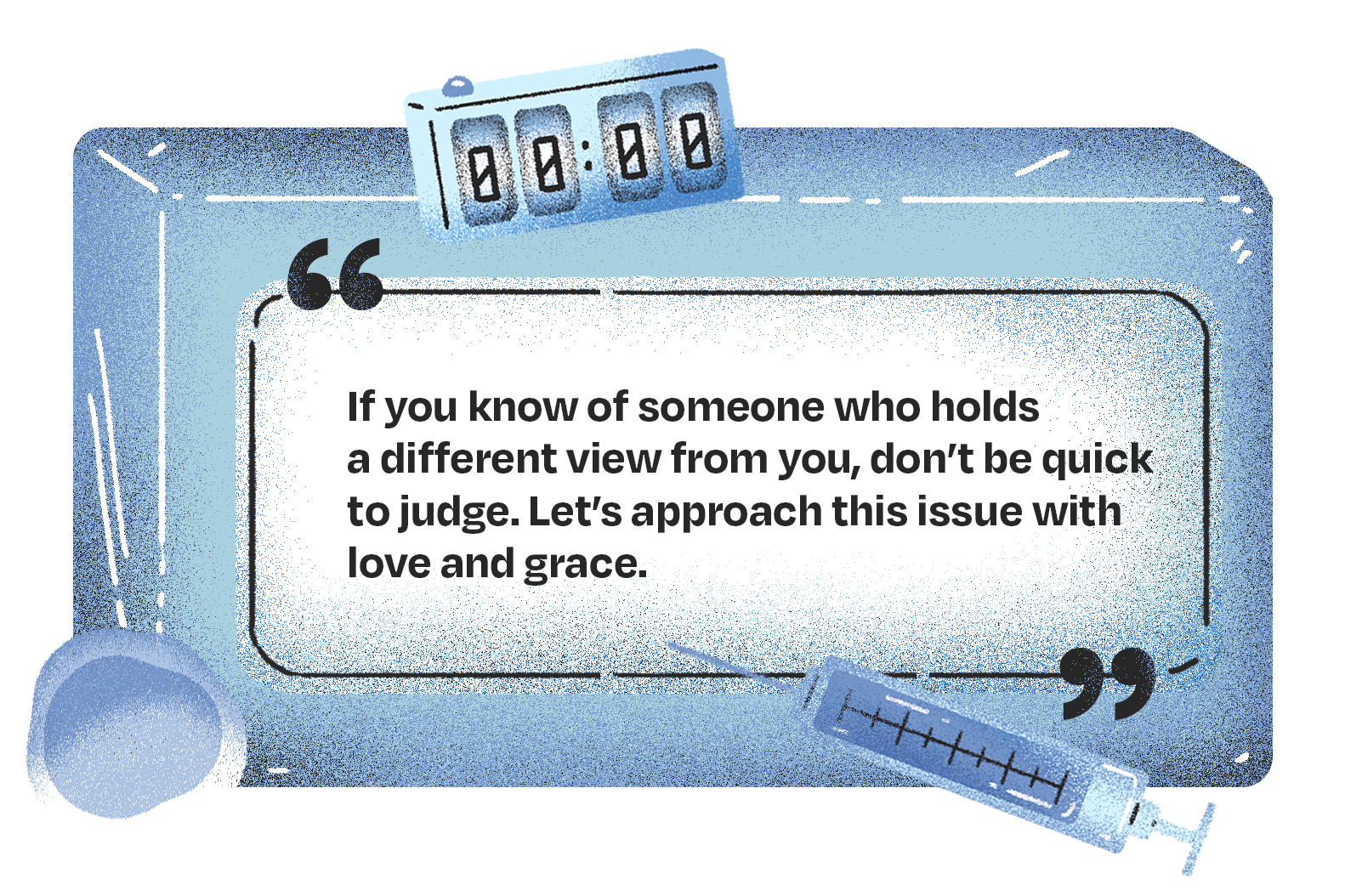
Seek God for wisdom as you form your own convictions on the matter (Proverbs 2:6, 9:10; James 3:13-18).
As you weigh the pros and cons, be open to advice from your community too.
Finally, if you know of someone who holds a different view from you, don’t be quick to judge. Let’s approach this issue with love and grace.


